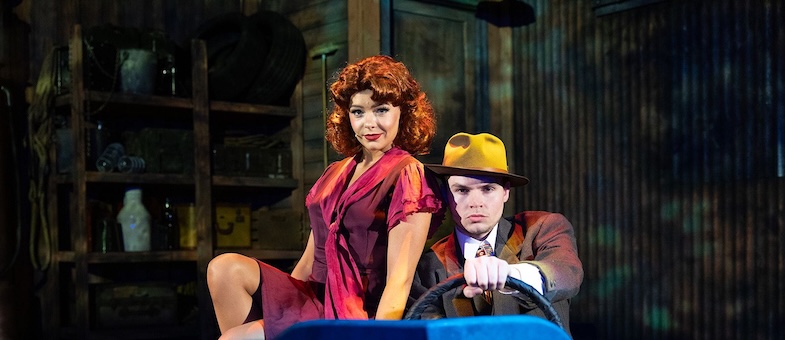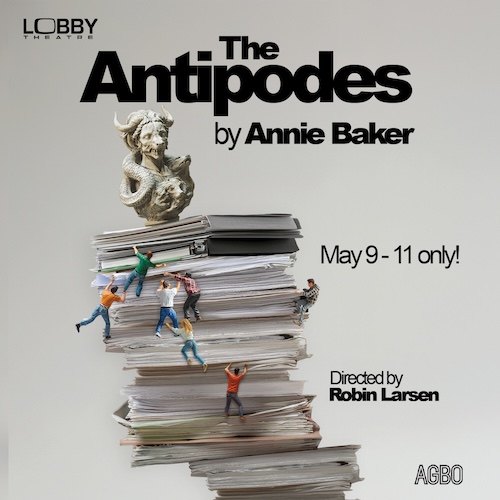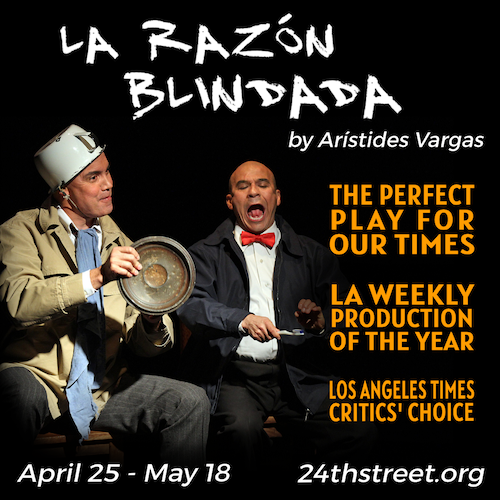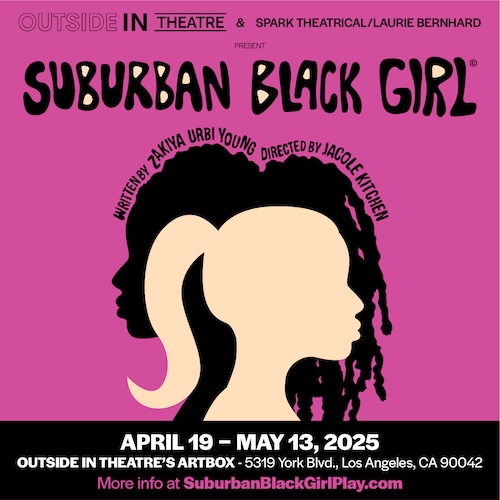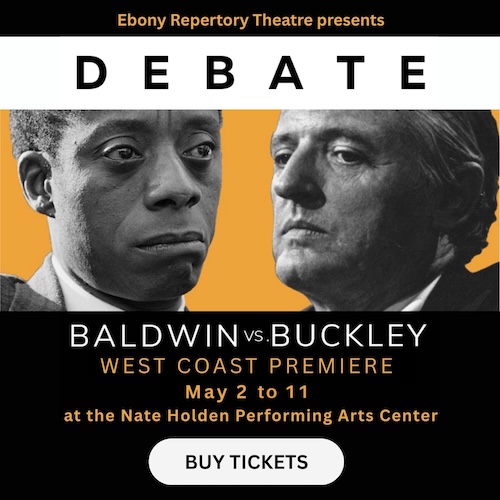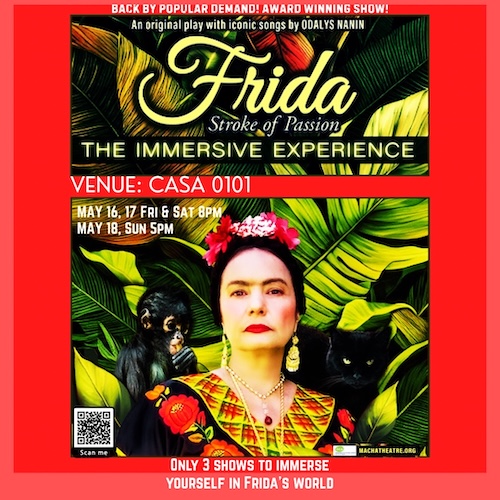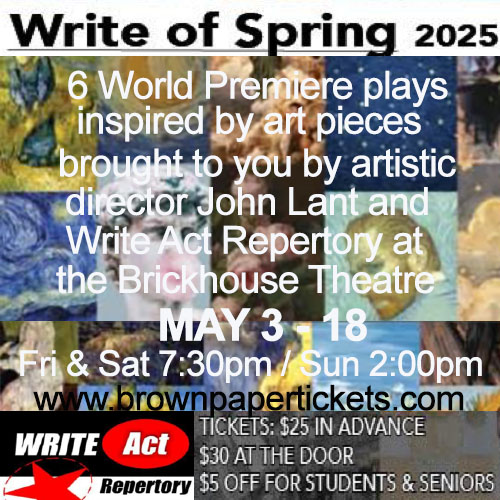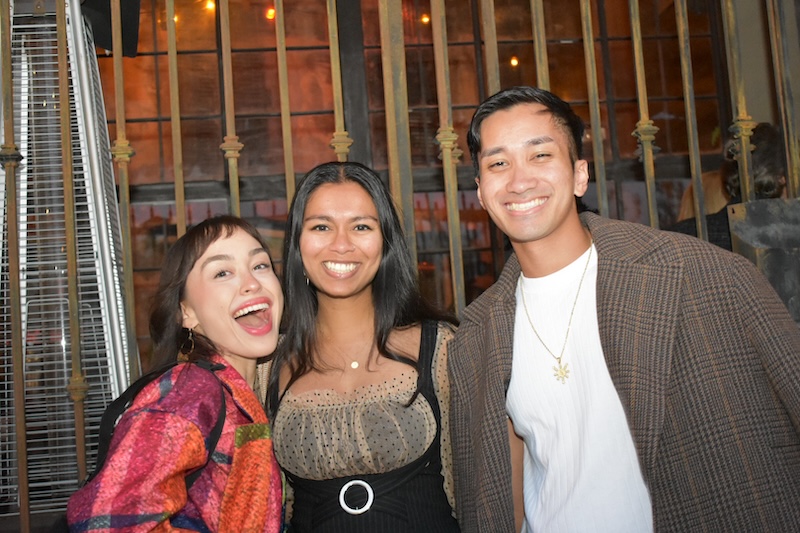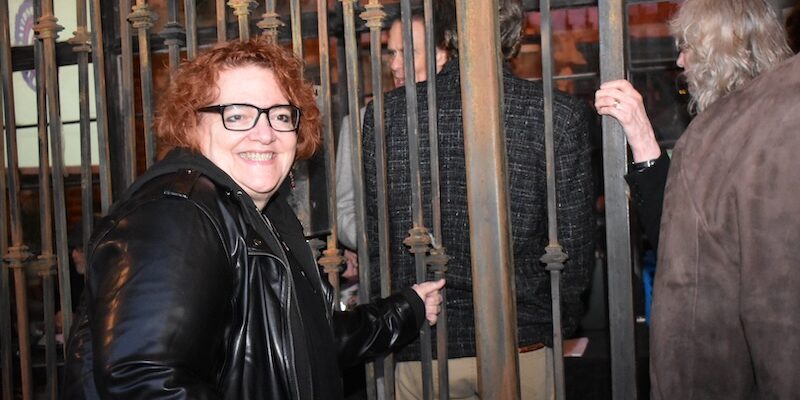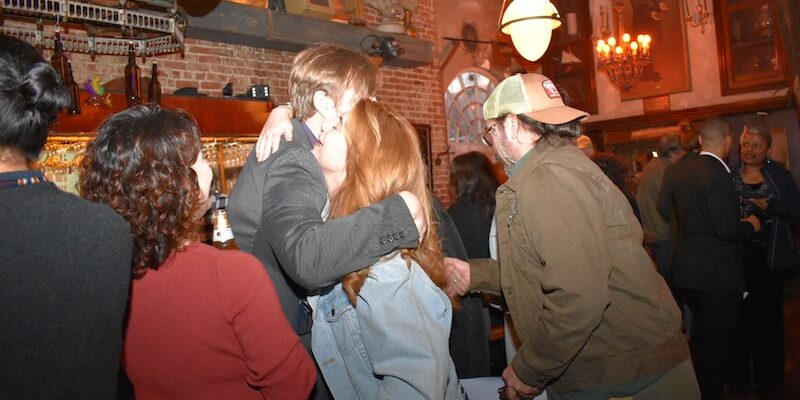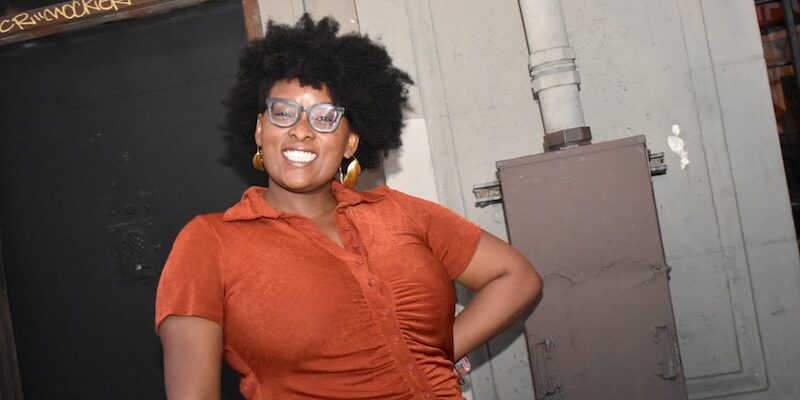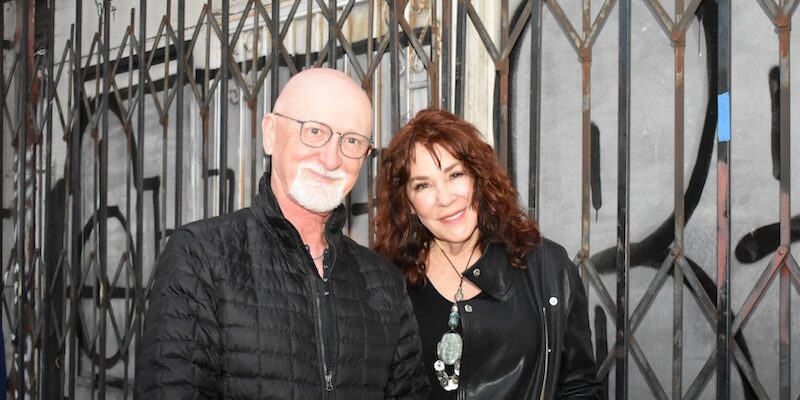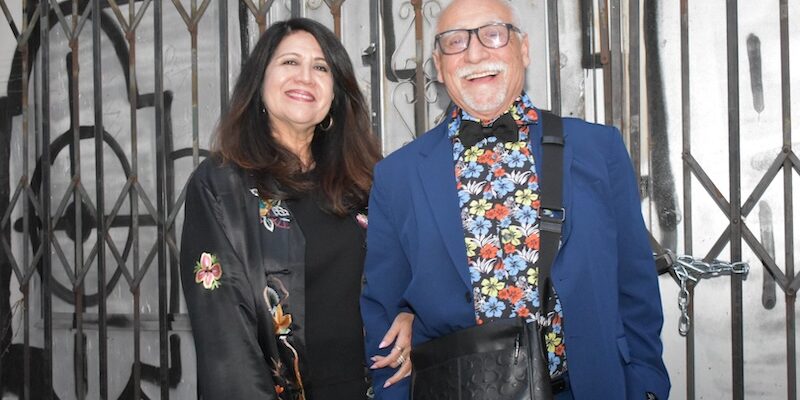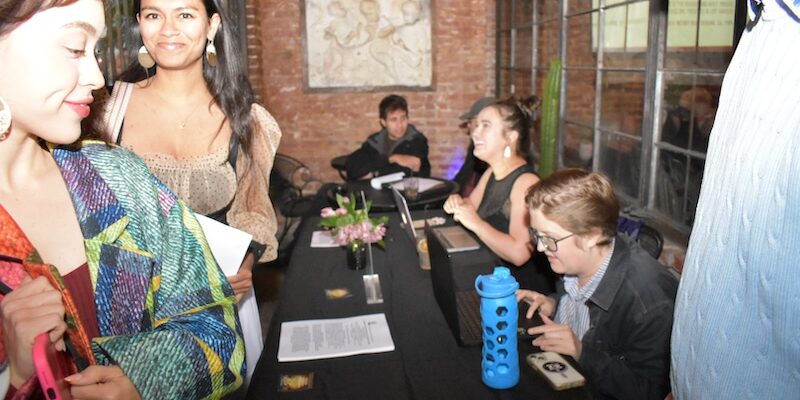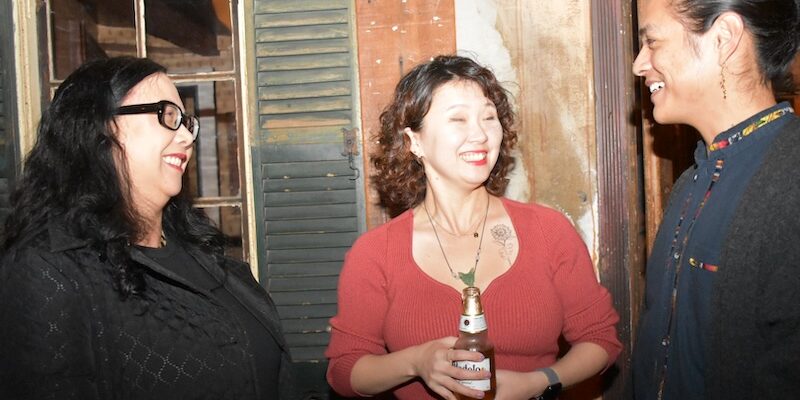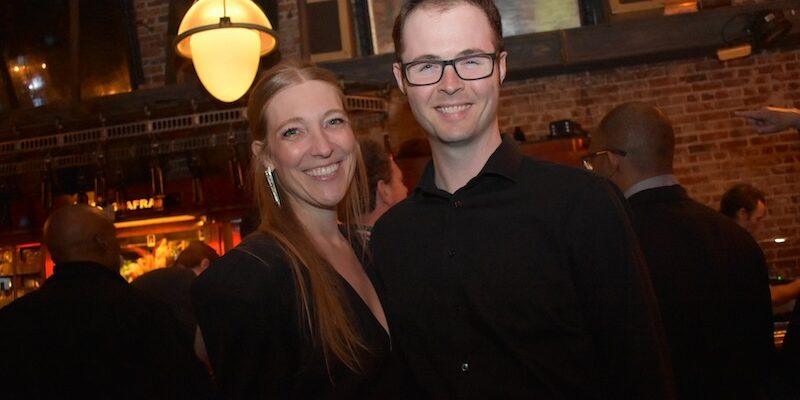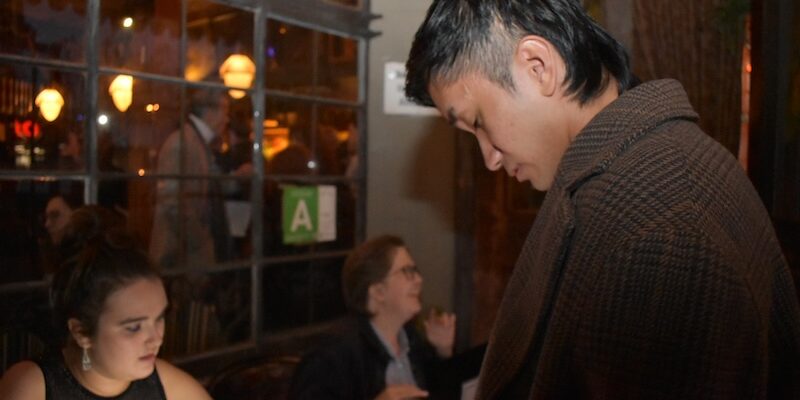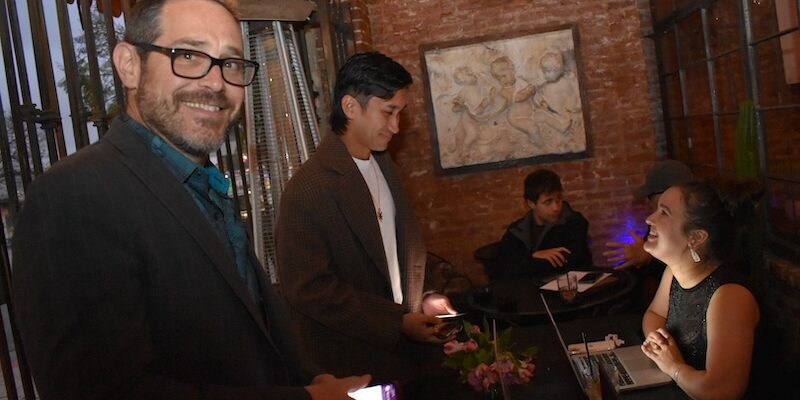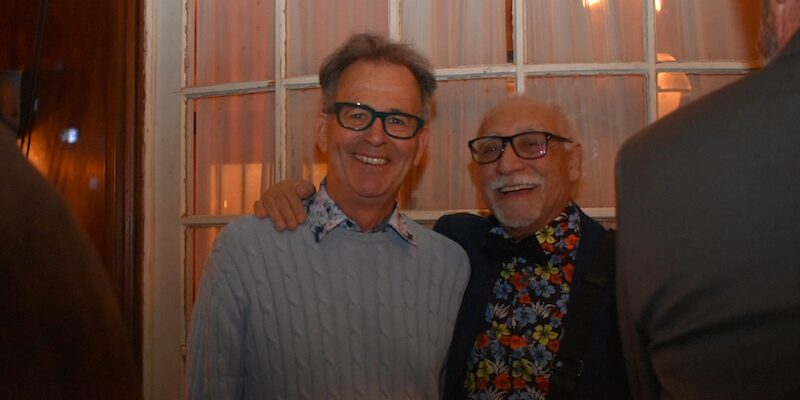
Ellie Smith and Russell Muzyczka (Photo by Lore Photography)
Reviewed by Philip Brandes
Rubicon Theatre Company
Through May 18.
RECOMMENDED
It’s no coincidence that the Great Depression was a golden age for the elevation of ruthless criminals to folk hero status. To a downtrodden populace bereft of hope for a better future, the transgressive exploits of John Dillinger, Machine Gun Kelly, Al Capone and other gangsters represented a vicarious triumph over an unfair social order. But of all the celebrity outlaws of that era, none more completely captured the public imagination than bank robbers Bonnie Parker and Clyde Barrow, who added a sheen of glamorous romance to their fugitive drama that continues to fascinate. A newly revised version of Bonnie & Clyde, the musical theatre adaptation of their complex, morally ambiguous story, makes its U.S. premiere with a spectacular hail of ballads and bullets in a newly-revised version at Ventura’s Rubicon Theatre.
Exploring the origins and short-lived but outsized careers of its renegade lover/anti-heroes, Bonnie & Clyde is a historically-based musical in the darker, grittier tradition of Chicago, Cabaret and Assassins. The concept and score were originally developed and produced in 2009 at nearby La Jolla Playhouse, with music by Frank Wildhorn, lyrics by Don Black and book by Ivan Menchell. Following a massive 2011 Broadway production which initially failed to catch fire in the U.S., the show underwent extensive reworking and sharpening through a series of well-received stagings in London’s West End.
So set aside anything you may have heard about or seen in earlier productions or in the concert version still available for on-demand streaming — the West End version of Bonnie & Clyde is a far more accomplished and rewarding experience.
At the helm of Rubicon’s production is J. Scott Lapp (who served as the original show’s assistant director throughout its evolution from La Jolla to Broadway), returning to the material with a 16-year perspective on its strengths, challenges, and further possibilities. Building on the improvements from the West End runs, Lapp has further shaped Bonnie & Clyde into a more intimate chamber musical better scaled to off-Broadway presentation.
In the titular roles, riveting Ellie Smith and Russell Muzyczka invest their characters’ yearnings, traumas, and passion with Broadway musical-caliber voices. As they depict Bonnie and Clyde’s evolution from small scale theft to headline-grabbing bank robberies and murder, they never lose sight of their characters’ tragically grandiose need for recognition and fame born out of their downtrodden origins — superbly rendered and repeatedly reprised in “This World Will Remember Me.”
These insights are not meant to excuse Bonnie and Clyde’s choices, but to make them understandable in human terms. Even at the height of their criminality, Smith’s Bonnie still harbors dreams of becoming a Hollywood “It-girl” (still in use, the phrase originated in reference to Bonnie’s idol, actress Clara Bow); Muzyczka’s Clyde clings to his hope to best the outlaw status of Billie the Kid and Al Capone.
To illuminate the childhood origins of these hopes, director Lapp restores the original version’s casting approach with 9 and 11-year old singer/actors in the “Picture Show” opener — a risk that pays off magnificently with a pair of performances by Harper Ham and Chance Challen (both of whom have professional careers awaiting them). In a further refinement, Lapp interleaves the pivotal Joplin shootout and escape sequence with re-appearances of the younger Clyde and Bonnie while their adult selves introspectively contemplate the consequences of their choices.
The equally well-cast supporting roles showcase Leland Burnett as Clyde’s dimmer, less ambitious brother and co-defendant Buck, and Amanda Dayhoff as Buck’s wife Blanche, who provides the lion’s share of the show’s comic relief even at its most intense turns.
Brayden Handwerger articulates the narrative’s ambivalent perspectives through the character of Ted, modeled on the real-life Ted Hinton who once knew (and perhaps courted) Bonnie in her pre-criminal life and ended up serving as a deputy on the posse that ultimately ambushed and killed her. As somewhat of the Mr. Cellophane-of-West-Texas, the role itself is a bit handicapped by exposition, but Handwerger brings genuine pathos and heartfelt voice to Ted’s conflicted longing to save victimized Bonnie and inflict destruction on villainous Clyde.
Bonnie & Clyde is a musical first and foremost, and brilliantly honors Wildhorn’s unique compositional gifts in a variety of genres, including blues, rockabilly, gospel, and even strains of Roaring Twenties jazz. In particular, Wildhorn’s extensive use of reprise is interwoven with the storytelling in inventive ways to create a sense of continuous movement with no hard breaks between scenes.
Wildhorn and Black’s score also features extraordinarily eloquent duets that venture far beyond the genre’s typical courtship exchanges, with parallel introspections from two characters on shared themes: In “You Can Do Better Than Him” Ted and Clyde give separate voice to their love for Bonnie, while in Bonnie and Blanche’s show-stopper, “You Love Who You Love,” each separately acknowledges the futility of resisting one’s heart.
While the piece has been streamlined to a chamber musical (with the original 19 member cast reduced to 12) production values remain high, on a par with anything L.A. would see in a national tour. Under Lisa Lemay’s assured musical direction, the offstage 5-piece band remains seamlessly piped in, synced and mixed through Danny Fiandaca’s sound design. A towering, adaptable set by Matthew Herman, lighting by Mike Billings and projections by both Herman and Billings are replete with visually arresting shocks and surprises. Costumes by Pamela J. Shaw add period authenticity.
Though the violence here is more stylized than gruesome and its protagonists remain engaging, personable and relatable throughout, Bonnie & Clyde doesn’t shrink from tracing their transformation into cautionary embodiments of an American Dream corrupted by vanity, greed, entitlement, and grievance. In real life, as the body count they left in their wake piled up, the tide of public opinion turned against them — but their funerals still drew thousands of looky-loos. Which in the end poses a challenge for each viewer’s moral compass: Are they still rebel heroes or have they become monsters, and if so, at what point did they cross that line? The question itself remains highly pertinent given the current state of our republic, so recently shown in the divided public sentiments over the gunning down of a health insurance CEO in retaliation for coverage denials.
Rubicon Theater Karyn Jackson Theatre, 1006 East Main St., Ventura. Wed.-Sat., 7 pm, Wed., Sat. and Sun., 2 pm; thru May 18. www.rubicontheatre.org. Running time: approximately two hours and 25 minutes with an intermission.


